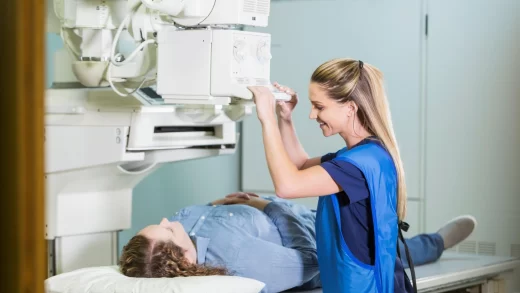How To Become A Surgical Tech? Best 5 Steps & Factors

Prior to conducting surgery, surgeons collaborate with a team of experts who prepare the operating room (OT).
They provide anesthesia to the patient, set up monitoring gear, organize blood transfusions, and more.
These people are surgical technologists, also referred to as surgical technicians.
Being a surgical technologist is one of the highest-paying occupations in the nation and a launching pad for other careers in the medical field, such as those of registered nurses and physician assistants.
Other names for surgical technologists are scrub techs, operating room technicians, and surgical assistants.
Continue reading to learn more about becoming a surgical tech, the career path, necessary licenses and certifications, job prospects, and pay in the US.
What Jobs Does A Surgical Tech Have?
An operating room’s precision-focused environment is controlled by a hierarchy of instructions and protocols.
Surgical technologists play a significant role in operating room setup, patient care, and support before, during, and after the procedure. They are in charge of a number of duties before, during, and after the process.
Previous To The Operation
Surgical technicians work alongside the surgical team to prepare the patients for surgery.
About 24 hours before the procedure, preparations begin.
A few potential elements include informing the patient’s relatives, getting the necessary signatures, and looking over the test findings. Other obligations include:
- preparation of the patient for surgery
- Set up the operating room for the procedure.
- Assist other team members with terminal cleaning in the operating room.
- Both to and from the surgical room, the patient is conveyed.
- After tying the patient’s arms to the table, sterile drapes should be draped around him or her.
- Make sure you’re warm to avoid sudden blood flow to your feet.
- Prepare sterile medications, instruments, and supplies.
- Help the anesthesiologist provide the patient’s anesthesia.
- Prepare the instruments if robotic surgery is being conducted.
Recommended: How Long Does It Take To Become A Vet Tech? Easy Guides
The Whole Operation
Surgical technologists are a second pair of hands for the surgical team. They see to it that the lead surgeon has access to the equipment required to focus only on the patient. The tasks include:
- Act as an assistant for the team and the surgeon.
- Distribute sterile equipment and supplies.
- Hold retractors or organs in place while the surgeon works on the patient.
- During laparoscopic surgery, you may adjust the robotic arms, equipment, and camera.
- While catheterized, urinate.
After The Operation
Even if a surgeon’s job is over after the surgery is complete, the following still fall within their purview. Verify if the patient’s body is empty and count all the accessories and equipment.
- Apply a bandage or dressing to the wound.
- Before transferring the patient to the main ward, take them to the recovery room.
- Restock the operating room for the next surgery.
- Inform the patient’s friends and carers.
- In order to improve patient care and quality, observations should be provided to the hospital.
- Typically, surgical technologists are generalists.
The parts that follow, however, let you specialize in certain surgical procedures:
- Neurology pertaining to the heart
- Orthopedic
- Reconstructive ENT
- (Ear, Nose, Throat) in urology.
- OB/GYN (obstetrics and gynecology)
Factors For Surgical Technologists’ Success
In addition to formal education, a surgical technician needs a broad variety of interpersonal skills to function in a challenging environment. The following skills and traits are required for surgical tech programs:
- Collaborating well with a team of surgeons and other support staff.
- You must listen to one another and the surgeon while speaking effectively to carry out a certain task.
- Keep your attention on the minute details in the operating room, such as organizing and sanitizing the surgical tools to prepare the procedure.
- Surgical professionals must maintain a laser-like focus while paying close attention without becoming sidetracked.
- Possess manual dexterity so you may assist the surgeons.
- Throughout the process, be aware of possible problems, anticipate them, and take the initiative to fix them.
- Watch your personal behavior, the team’s behavior, and the behavior of the medical supplies.
- During surgery, surgical technicians provide the first support.
- They closely follow the surgeon’s directions and provide simple responses.
Recommended: What Is Tech Neck? Its Effects & 10 Methods To Avoid
How Do You Become A Surgical Technologist?
Being a surgical technician requires planning and following a set path. By mastering the subject’s fundamentals, you may begin your journey toward becoming a surgical technology expert.
After completing your program, you will enter a competitive job market with the skills, education, and experience that employers value.
In order to help you in your career as a surgical technician, review the five steps below.
Step# 1:
To get a GED or graduate from high school, it might take up to four years. It is a requirement for any surgical technology program.
Students need to finish biology, hard sciences, and anatomy classes in order to be prepared for college-level coursework.
Internships at neighboring hospitals may also help you get broad healthcare expertise.
Step# 2:
Earn an associate’s degree from a community college or technical institute. Practical training is a component of this two-year surgical tech curriculum.
The U.S. military training program’s formal surgical training is provided for 12 to 14 weeks.
The Commission on Accreditation of Allied Health Education Programs (CAAHEP) and the Accrediting Bureau of Health Education Institutions (ABHES) are two respectable organizations from which prospective students should pick accredited schools (CAAHEP).
Step# 3:
It is advised to participate in a hands-on learning program like an internship or shadowing other surgeons before enrolling in an educational program. It encourages the growth of knowledge and business relationships.
Step# 4:
After graduation, students may sit for the national certification exams offered by the National Board of Surgical Technology.
Even while not all countries mandate certification exams for surgical technicians, they do increase job prospects.
Step# 5:
Graduating students may begin their jobs as entry-level technicians. Additionally, as they gain experience, they may join organizations like the Association of Surgical Assistants (ASA) or the National Surgical Assistant Association (NSAA).
These associations provide networking opportunities inside the industry to your advantage.
Examination Specifications
A high school certificate or a GED must be shown as official identification while taking any certification exam. They must provide a copy of the surgical technology program as well as a certificate of completion with their graduation date.
Surgical Technologist, Certified
The National Board of Surgical Technology and Surgical Assisting certifies surgical technologists and first assistants (NBSTSA).
You must have state-issued certification as a surgical technician before you may begin working.
However, certification enables surgical technicians to demonstrate their knowledge and ability to meet job standards in a certain field.
It further illustrates your credentials and shows that you are looking for work. Finally, it establishes the framework for ongoing education and growth via recertification.
CST Certification
- The National Board of Surgical Technology and Surgical Assisting (NBSTSA) will certify you as a Certified Surgical Technologist if you meet the qualifications outlined below (CST).
- At the time of your enrolment, the program must be properly accredited by either CAAHEP or ABHES. You must provide the following documentation:
You must provide a copy of your diploma or transcript together with a notarized letter on the institution’s letterhead that includes your name, graduation date, and degree type.
NCCT Certification
The National Center for Competency Testing offers the Certified TS-C certification to current students, seasoned professionals, and military personnel. It would be useful if you meet the following criteria:
A Recent Graduate OR A Student
You must send a copy of your surgical technologist program transcript, diploma, or certificate.
Within two years of the test date, all case documentation must be completed, including apprenticeship programs registered with the US Department of Labor.
Experienced Individuals In The Field:
Three years of full-time, fully documented work experience in Surgical Technology.
- Your ability to collaborate closely with a Certified
- Licensed Physician Care Provider OR
- Registered Nurses must be shown
Graduates and seasoned professionals alike are required to complete the Tech in Surgery – Certified (NCCT) Critical Skills Competency form and be enrolled in a U.S. high school or have a GED.
Recommended: Why Tech Illustration? Types & 5 Effective Tips
Surgical Technologists’ State-Level Licensing
In the US, different states have different requirements for surgical technicians’ licenses. It is essential to go to the state licensing website prior to submitting an application for a license. One of the aforementioned certification exams would be required of graduates.
The Association of Surgical Technologists (AST) states that all surgical tech schools graduates must finish the following:
- Completion of a CAAHEP-approved surgical technology program.
- Obtain the Certified Surgical Technologist (CST) credential from the NBSTSA.
- To keep your CST certification valid, complete the necessary continuing education (CE) hours.
In Rhode Island, surgical technicians are exempt from taking a certification exam. Surgical technicians must be licensed in the close-by states of Massachusetts and New York, according to the ACT’s regulations.
The ACT’s rules say that surgical technologists must be trained and licensed in the following states:
- Idaho
- Indiana
- Nevada
- New Oregon
- South Carolina, & Tennessee
Even if they do not have the CST certification, Texas surgical technicians are still required to register in the following states:
- Dakotas
- Colorado
- North Washington
Optional title protection and registration are available in the following states:
- Illinois
- Virginia
- Arkansas
Requirements For The Continuing Education Of Surgical Technologists
In order to maintain their certification, surgical technologists must fulfill continuing education requirements and pay a fee.
In addition to the requirements listed below, trained surgical technicians need to finish 30 CE credits minimum in two years. By the conclusion of the two-year cycle,
- 30 CE credits, including 4 advanced credits, must be attained.
- 60 CE credits must be earned before the four-year cycle is through.
For getting CE credits, the following options are available:
- CE Hospital In-Service Training at
- AST Online Courses
- At national conferences,
- ACS Congresses, & AST state assemblies,
- live lectures are presented
- Live events for producers of healthcare
Application forms are provided for both state and federal certifications.
Job Prospects
Among other contexts, a surgical technologist may work in ambulatory care facilities, dentist offices, clinics, private physician offices, outpatient care facilities, and hospital surgical centers.
The Bureau of Labor Statistics (BLS) predicts a 6% growth in surgical technologists and assistants between 2021 and 2031.
In terms of speed, this is in line with the national average for all other vocations.
Every year, over 9,600 opportunities for surgical assistants and technicians will open up in order to employ new workers and replace those who depart from the field.
A Surgical Technologist’s Salary
How much do surgical technologists make then? A surgical technologist gets an average annual salary of $48,510 ($23.32 per hour), according to the Bureau of Labor Statistics. The top 10% of surgical technologists earned $75,940 annually.
The American states with the highest surgical technologists’ wages were:
- In Alaska, $65,690
- California’s $68,410
- For the District of Columbia, $65,250
- Nevada: $65,180
- in Connecticut, $65,250
The median yearly wages in the top five California cities for surgical technologists ranged from $74,330 to $80,450.
Your professional experience and practical knowledge are crucial. The average hourly income for individuals with less than a year of experience is $19.68, while the average hourly wage for those with more than 10 years of experience is $25.17.
Conclusion
Despite doing the unnoticed job, surgical technicians are essential. Throughout the whole surgical procedure, surgical technologists are in charge of a range of responsibilities.
They pay close attention to the medical procedure, finish everything on the to-do list, and guarantee a successful operation.
Surgical tech is the profession to pursue if you want a position that demands a lot of responsibility and a variety of talents.
You might work in the healthcare industry without finishing the extensive education required to become a doctor or nurse.
With the surgical technology degree program at NEIT, you have the opportunity to begin this exciting and fast-paced career.
Our program provides a 20-week clinical internship and a 160-hour surgical lab simulation as opportunities for practical training.
For further information on the associate degree program, call us at 401-739-5000 or write us a letter.
Surgical Tech (FAQs)
How long is the training program for surgical technologists?
In 12 to 24 months, a surgical technologist may become one. You may enroll in the course at a community college, but be aware that it has to be certified by the Commission on Accreditation of Allied Health Education Programs (CAAHEP) or the Accrediting Bureau of Health Education Schools (ABHES) (ABHES).
Surgical Tech Jobs | Are They Good?
Surgical technicians should anticipate a stable, rewarding career with the potential for promotion. With experience, students may rise in their careers as surgical first assistants.
What Do Surgical Technologists Earn? In contrast to nurses?
No, nurses make more money than surgical assistants do. According to the Bureau of Labor Statistics, the median annual salary for a surgical tech is $48,510, whereas the normal annual salary for a nurse is $77,600 (or $37.31 per hour) (BLS).
Can a surgical tech get certified without passing an exam?
Yes, it is possible to become a surgical tech without completing a certification exam. However, the majority of companies favor candidates who have successfully completed the national certification program.
Anyone having a degree from a university recognized by the ABHES or the CCHEP is eligible for this program. Your chances of landing a job growth, as does your view on money.














